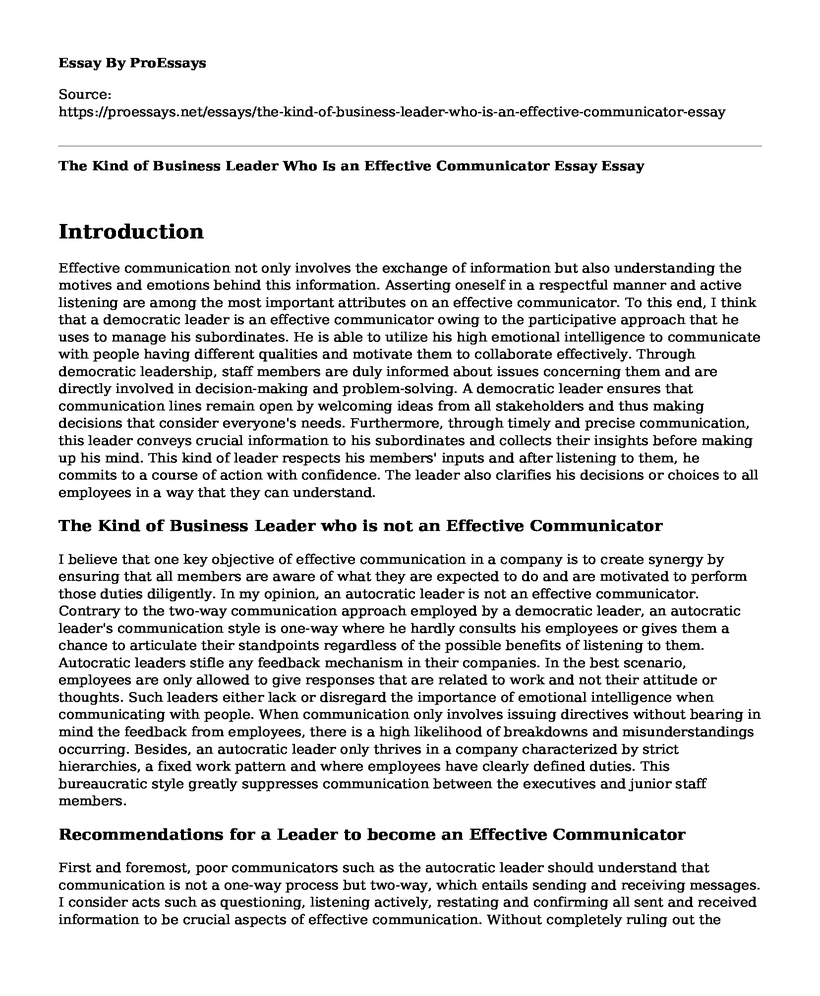Introduction
Effective communication not only involves the exchange of information but also understanding the motives and emotions behind this information. Asserting oneself in a respectful manner and active listening are among the most important attributes on an effective communicator. To this end, I think that a democratic leader is an effective communicator owing to the participative approach that he uses to manage his subordinates. He is able to utilize his high emotional intelligence to communicate with people having different qualities and motivate them to collaborate effectively. Through democratic leadership, staff members are duly informed about issues concerning them and are directly involved in decision-making and problem-solving. A democratic leader ensures that communication lines remain open by welcoming ideas from all stakeholders and thus making decisions that consider everyone's needs. Furthermore, through timely and precise communication, this leader conveys crucial information to his subordinates and collects their insights before making up his mind. This kind of leader respects his members' inputs and after listening to them, he commits to a course of action with confidence. The leader also clarifies his decisions or choices to all employees in a way that they can understand.
The Kind of Business Leader who is not an Effective Communicator
I believe that one key objective of effective communication in a company is to create synergy by ensuring that all members are aware of what they are expected to do and are motivated to perform those duties diligently. In my opinion, an autocratic leader is not an effective communicator. Contrary to the two-way communication approach employed by a democratic leader, an autocratic leader's communication style is one-way where he hardly consults his employees or gives them a chance to articulate their standpoints regardless of the possible benefits of listening to them. Autocratic leaders stifle any feedback mechanism in their companies. In the best scenario, employees are only allowed to give responses that are related to work and not their attitude or thoughts. Such leaders either lack or disregard the importance of emotional intelligence when communicating with people. When communication only involves issuing directives without bearing in mind the feedback from employees, there is a high likelihood of breakdowns and misunderstandings occurring. Besides, an autocratic leader only thrives in a company characterized by strict hierarchies, a fixed work pattern and where employees have clearly defined duties. This bureaucratic style greatly suppresses communication between the executives and junior staff members.
Recommendations for a Leader to become an Effective Communicator
First and foremost, poor communicators such as the autocratic leader should understand that communication is not a one-way process but two-way, which entails sending and receiving messages. I consider acts such as questioning, listening actively, restating and confirming all sent and received information to be crucial aspects of effective communication. Without completely ruling out the importance of an autocratic style in some business contexts, I would suggest that leaders who follow this approach should adapt themselves to the kind of audience they are addressing. When speaking to employees who have little knowledge of the business operations, the leader can be more authoritative. However, when speaking to clients, the community, technical staff members or higher ranking employees, this leader should be welcome input from those members. All in all, it will be important for such a leader to listen quietly to what his audiences are saying irrespective of their position. Listening will enable him to observe and read the thoughts, behavior or any anxieties in his subordinates and ultimately adapt his messages to suit the current situation. By understanding the underlying emotions behind their actions, he will be able to pass information to his employees in a way that it stimulates and encourages them to perform their duties diligently.
Cite this page
The Kind of Business Leader Who Is an Effective Communicator Essay. (2022, Sep 26). Retrieved from https://proessays.net/essays/the-kind-of-business-leader-who-is-an-effective-communicator-essay
If you are the original author of this essay and no longer wish to have it published on the ProEssays website, please click below to request its removal:
- Knowledge Sharing in Decision-Making Essay
- Paper Example on International Strategic Management
- Incident in the Lounge Essay Sample
- Ethical Considerations and Possible Research Questions for the CEOs and Employees
- Catching the Interests of Physician Leadership Essay Example
- Gender Composition: Social Construction of Sex From Genitalia Identity - Essay Sample
- Reducing Expenses & Increasing Profits: Companies Adopt SCADA Operation for Business Networking - Paper Sample







